Current as of: January 8, 2026 - 08:26

Cycle Kerala & Tropical India Trip Notes
- Ways to Travel: Guided Group
- Destination: India
- Programmes: Cycling
-
Activity Level:
4 out of 7 - Moderate & Challenging
- 14 Days: Land Only
- Ages: 16+
- Trip Code: MIK
- Carbon Footprint: 30kg CO2e
Trip Overview
Join fellow cyclists to explore the idyllic south, from the Western Ghats to the beaches of Kerala
Jump on the saddle to discover laidback southern India on this cycling group adventure. Accompanied by an expert tour leader and a support vehicle, we are on the saddle most days, riding from the cool Western Ghats to the quiet backwaters of Kerala. Expect some challenging rides – there are high fives all round at the top of the Ooty hairpins! – plus off-the-saddle adventures, including a traditional houseboat stay and a 4×4 safari in Bandipur National Park. We finish in Varkala, on the old hippie trail, for downtime at the beach.
At a Glance
- Accommodation: 4 Superior nights (hotel), 8 Classic nights (7 hotel, 1 houseboat), 1 Simple night (jungle lodge)
- 10 days of cycling (including one optional ride) with full vehicle support
- Group normally 4 to 14, plus local cycling leader and driver. Minimum age: 16
Highlights
- Discover idyllic southern India by bike, the most immersive way to experience the friendly people and incredible landscapes
- Challenge yourself to climb the fabled hairpins of Ooty
- Cruise the backwaters of Kerala on a traditional rice barge – a classic experience in South India!
- Search for monkeys and elephants on a 4x4 safari in Bandipur National Park
- Finish at the beach, relaxing in the old hippie trail town of Varkala
Is This Trip for You?
This cycling adventure is classified Activity Level 4 (Moderate & Challenging). For more information on our trip gradings please visit the Activity Level Guidelines page. If you have any queries about the difficulty of the trip please do not hesitate to contact us.
It is ideal if you’re a competent cyclist, ideally with at least one or two cycling trips under your belt. The temperature and humidity can be challenging but we schedule plenty of water and comfort breaks. A support vehicle, which can take a maximum of five passengers with bikes, is available if you wish to take a break from cycling.
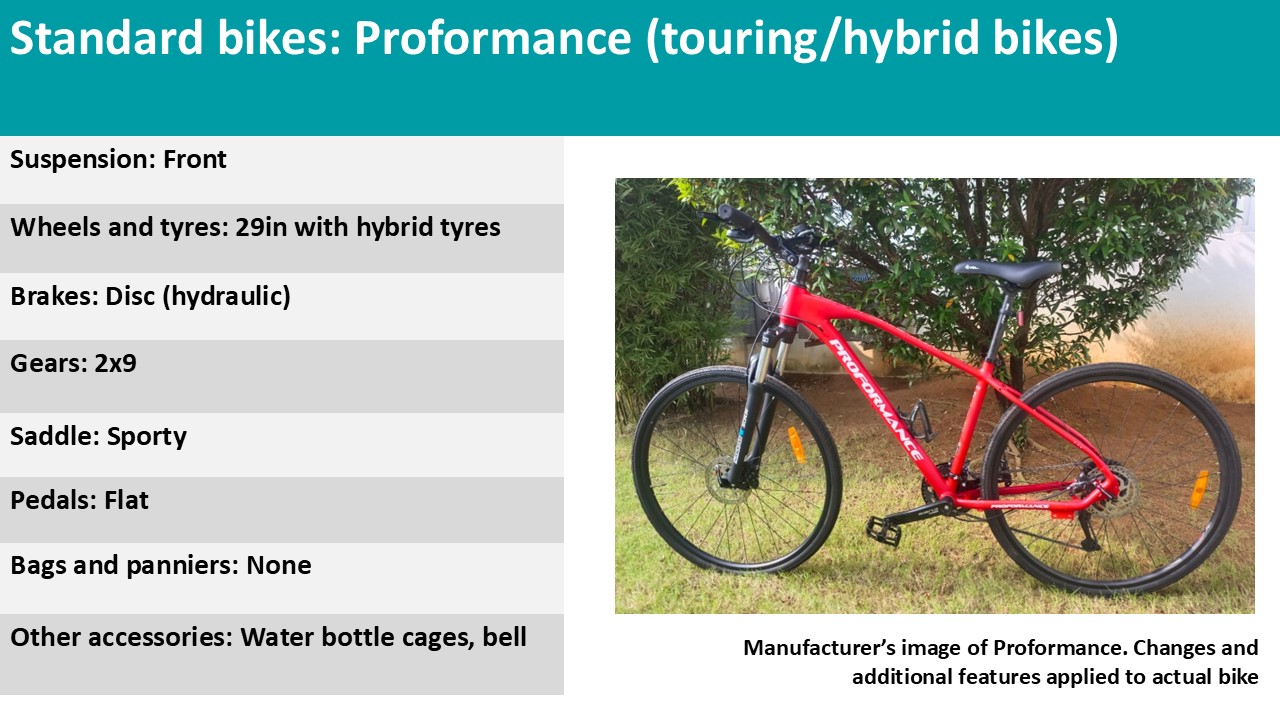
- 10 days of cycling (including one optional ride)
- Average 34mi (55km) per day with vehicle support
E-bikes: E-bikes are available on this trip for an additional cost and subject to availability. Read our e-bike fact sheet for more information on the e-bikes available for this cycling adventure.
Route: We aim to cycle door-to-door for most of the route, with only a few transfers needed due to longer distances, national park restrictions and busier roads. The cycling is mainly on surfaced roads with a few rough, potholed sections. Please bear this in mind if you are bringing your own pedals and clip-in shoes. Day 3 is the longest ride day at 56mi (90km), mostly on good roads with some gentle undulation.
Terrain and traffic: This is a good all-round trip with plenty of flat riding, lots of downhill and a challenging climb. We mainly follow backroads with little traffic, but traffic does increase when approaching towns. The roads can be busy and you must be a confident rider who has cycled in traffic before. Tour leaders will brief you on the rules of the road; please listen carefully and follow the instructions.
Climate: It can be hot and humid in India, particularly during September-November and March-May, which can increase the difficulty of the cycling.
Sights and monuments: Please note, the Archaeological Survey of India (ASI) is responsible for the conservation of many monuments in India and very occasionally this may mean that work is taking place at sites visited on this trip. The ASI schedule is never published, so it is impossible to forewarn our clients of when work will be taking place.
Water safety: This trip includes time by a lake, river or sea, where there may be opportunities to swim. You should always seek local advice before deciding whether to swim. Open-water or wild swim spots should be treated with extreme caution. Information on how to keep yourself safe while swimming is shown here.
Group
Our Indian team of leaders has proved very popular with their incredible knowledge, passion and hospitality adding greatly to the experience. There is no better way to experience Indian culture than letting an Indian guide show you around their country.
Adult min age: 16
Min group size: 4
Max group size: 14
Itinerary
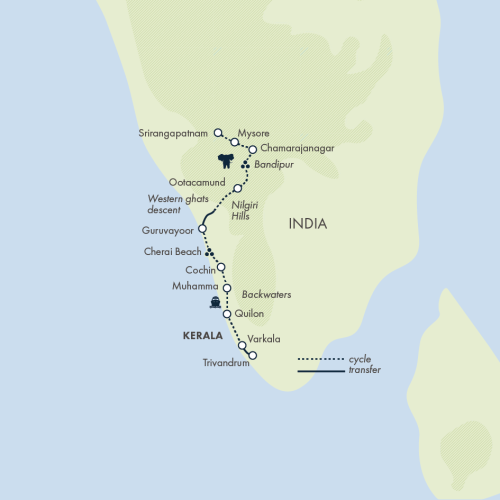
Land Only
- Start City: Mysore
- End City: Varkala
Land Only Itinerary
The adventure begins in Mysore. We usually meet at lunchtime after hotel check-in for a short post-lunch walk around the markets. Late this afternoon we have a bicycle briefing and fitting so that any necessary adjustments and safety checks can be made.
Around 6pm, we gather as a group to get to know each other and learn more about the adventures ahead over a welcome meeting. Your tour leader then arranges a group dinner at a nearby restaurant.
Want more time in Mysore? Secure pre-tour hotel nights through your sales representative
Accommodation: Hotel Sandesh The Prince (or similar)
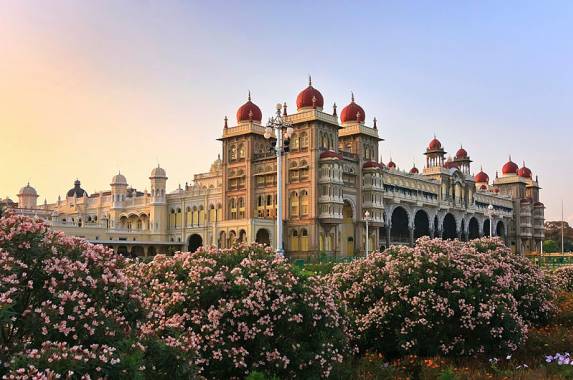
We start with a leisurely morning ride to Srirangapatna, the ruins of Tipu Sultan’s capital, which were destroyed by the British in 1799 during their final battle to secure control of southern India. The fortress stands on an island in the middle of the Cauvery River; once over the bridge, we cycle around the old ramparts, enter Tipu Sultan’s Mosque and the Ranganathaswamy Temple before riding back to Mysore for lunch.
For lunch, you get your first taste of thali, the southern Indian meal of rice and multiple small curries on a plate, or the typical south Indian masala dosa, a thin pancake made with fermented rice and lentil batter.
In the afternoon, we have a guided tour around Mysore Palace. Also known as the Amba Vilas Palace, it is the official residence of the Wodeyars, the former royal family of Mysore, which ruled the princely state of Mysore for more than seven centuries. The decor is stunning, if a little bit over the top, and the former maharaja is still in residence in his private quarters.
Accommodation: Hotel Sandesh The Prince (or similar)
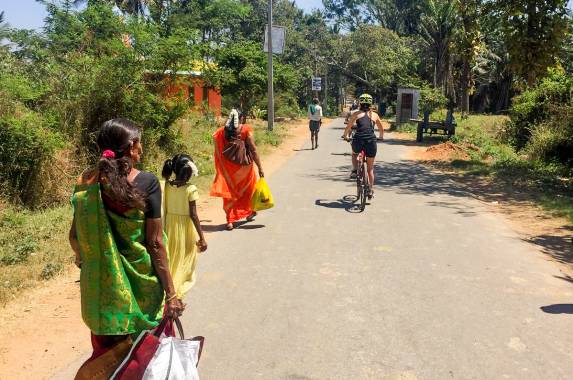
We leave the hotel and cycle out of Mysore town up to Chamundi Hill to view the 16.5ft (5m) rock carving of Nandi, Shiva’s celestial bull. There are also good views over the whole of Mysore. We then cycle back down the hill and continue along the quiet backroads, along with the children riding a bike or bus to school. We also share the road with herds of white oxen and women in colourful saris carrying waterpots on their heads.
Our ride takes us through the backroads to a quaint little village where we stop to enjoy a picnic lunch. After a comfortable lunch, some rehydration and rest, we continue to Chamarajanagar. We should arrive at our hotel in Chamarajanagar by late afternoon to relax by the pool or enjoy a cold drink.
Accommodation: Nijaguna Resort (or similar)
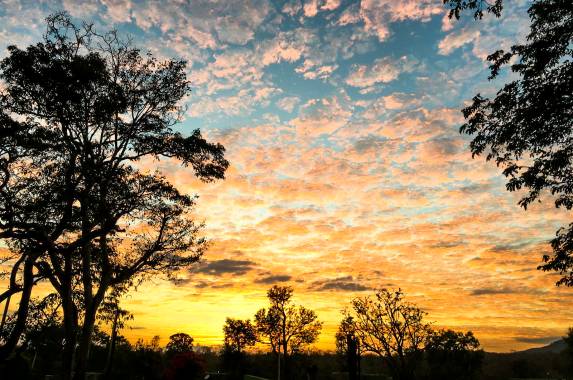
After breakfast, we ride along the villages outside the forest areas to witness village life and continue along the backroads to the outskirts of Bandipur Sanctuary.
We should arrive at our hotel in Bandipur National Park in time for lunch. In the late afternoon, we take a 4×4 safari in the park to see lots of peacocks, spotted deer and monkeys, with the chance to see wild elephants, Indian bison, and, at certain times of the year, the elusive tiger.
Accommodation: Bandipur Safari Lodge (or similar)
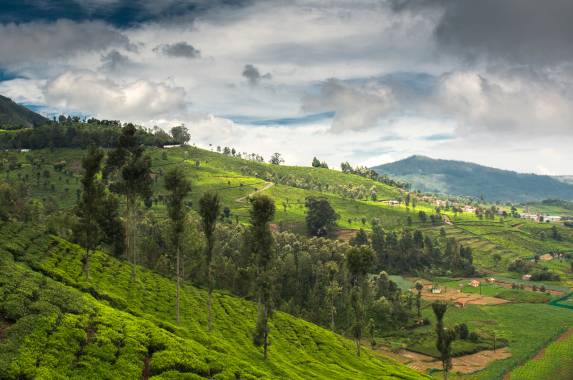
Today is the highlight of the trip for some, ascending 4,104ft (1,251m) to Ooty (Ootacamund), a resort town in the Nilgiri Hills and the former summer capital of the Raj.
After an early breakfast, we take local transportation to Kalhatty, a small village on the way up. Due to cycling restrictions to mitigate animal-human conflict, we start our ride just outside the forest area, from the 20th hairpin of the 36 bends. It’s a very steep ride up with stunning vistas at every turn; we have plenty of photo opportunities along the way, which double as rest stops. Reaching the top is a huge achievement and we should all take a moment or two to bathe in our success!
Alternatively, enjoy a relaxed morning and journey up the hill in the support vehicle. After tea and cake at the top, we have an undulating ride into Ooty.
Ooty is called the Queen of the Hill Stations and, although it is now a busy little town, there is lots to see and do. Originally occupied by the tribal Todas, the area came under the East India Company at the end of the 18th century. The British introduced tea, and the hillsides around Ooty are covered in tea gardens.
Arriving late morning, we take lunch in our hotel. The afternoon is free to explore town and sample the local cardamom tea. Both the Botanical Gardens and the Rose Gardens are a short walk from our hotel. In town, there are many shops selling locally grown tea and oils and homemade chocolate.
Accommodation: Fortune Resort Sullivan Court (or similar)
Upgrade your room today – speak to your sales representative for more details
After breakfast, we have a stunning ride across the rolling Nilgiri Hills, the backdrop for many Bollywood movies, before starting the dramatic descent, dropping 6,560ft (2,000m) through the hills and tea-covered slopes of the Western Ghats. The ride offers fantastic views over the hills below and there are spectacular viewpoints. After 34mi (54km), we reach Gadalur, a typical Indian town with one long high street selling everything, with shop fronts covered in colourful adverts and cheap children’s toys. We have a tea break here before heading towards Kerala with the final 12.5mi (20km) descent through tropical rainforest and bamboo-covered slopes to our end point at a typical Keralan roadside restaurant.
The bikes are loaded as we enjoy lunch and then transfer (3hr 30min) to Guruvayoor to avoid busy roads. Please note that although the road is not very busy the road surface today is probably the worst of the trip. There are many potholes and the road surface is not even. Please take care and concentrate while cycling.
Arriving in Guruvayoor, we have time to relax before wandering into town to sample delicious Keralan street food and have an evening stroll outside the temple, which comes alive at night. It is one of the most important places of worship for Hindus in Kerala and the fourth-largest temple in India. The town is filled with devotees dressed in traditional Keralan costume, who come here in their thousands to offer rice, flowers and gold to Lord Krishna, an incarnation of Lord Vishnu.
Accommodation: Sopanam Heritage (or similar)
Today, we cycle by the Shree Krishna Temple. A little further is another religious centre, Palayur Church, one of the oldest churches in India and founded by Saint Thomas the Apostle, who landed in India in 52 CE.
From here, we head towards the coast, cycling along country roads lined with mango and coconut trees. There are plenty of photo opportunities as we observe traditional life. Later, crossing bridges, we cycle onto Vypin Island, arriving at Cherai Beach early afternoon. The rest of the day is free to enjoy this stunning location and swim in the Indian Ocean. Cherai is known for mouth-watering fresh seafood, so for dinner, you could try jhinga kachcia aam kari, a speciality dish from Kerala made with green mango and prawns simmered in coconut milk and spices.
Accommodation: Sea Lagoon Health Resort (or similar)
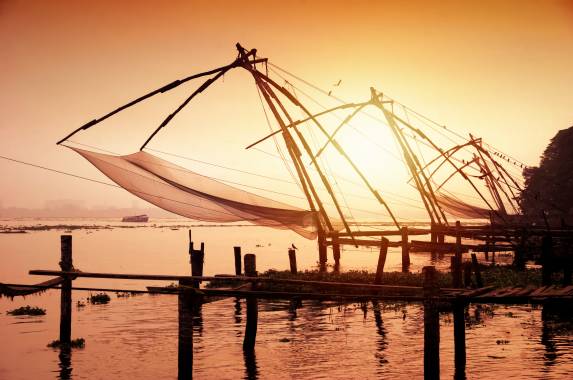
We set off from our beach location towards the port city of Kochi (formerly Cochin), cycling south and passing through small fishing communities where colourful boats are hauled up along the sands. Turning inland, we see grand houses built with the remittance money from the Gulf States workforce, plus older houses constructed during the British colonial period. Please note, the traffic levels are high for the last 5mi (8km) as we arrive at the main road to board the ferry to the Fort Kochi neighbourhood. This has a unique place in Indian history, and to soak up the atmosphere we spend the next two nights here. After hotel check-in, we wander down to one of the restaurants in the old harbour area for lunch. Those wishing to visit the Indo-Portuguese Museum should do so today, as it is closed on Mondays.
Accommodation: The Dutch Bungalow (or similar)
Upgrade your room today – speak to your sales representative for more details
Today is a free day to explore Kochi with its bazaars and old harbour area. The Portuguese established a base here, followed by the Dutch, who were forced to hand it over to the British in 1841. A potpourri of Indian and international communities, it is now the bustling commercial capital of Kerala and consists of several islands connected by ferries. Most of the major sights are close by in the neighbouring areas of Fort Kochi and Mattancherry. Warehouses that smell of tea and spices are lime-washed bright green, yellow and blue; rickety old bikes and hand-painted trucks piled high with goods fill the narrow streets and food stalls stand on every corner.
St Francis Church is close to the hotel. Built by the Portuguese in 1503, it is the burial place of explorer Vasco da Gama and his tomb is inside the church. Further along, you come to Mattancherry and the Dutch Palace. Constructed by the Portuguese in 1568, it was gifted to the Maharaja of Kochi before the Dutch took it over. Close to the palace is Jewtown and the Paradesi Synagogue. Built in 1568 for the Jewish members of the Kochi trading communities, it is adorned with hand-painted tiles from China and elegant Belgian chandeliers, all donations from wealthy merchants. The area around the synagogue, Jew Street, is a heritage zone with many antique and handicraft shops and is excellent for shopping.
For a culinary experience, try the fish market near the Chinese fishing nets, where you can buy the day’s catch and have it cooked to your taste. There are also plenty of shopping opportunities here.
Accommodation: The Dutch Bungalow (or similar)
Upgrade your room today – speak to your sales representative for more details
Riding from Fort Kochi, we pass 500-year-old Portuguese villas, a striking contrast to the tiny fisherman huts dotted along the beach road. Many of these fishing villages are Christian; at the coastal town of Arthunkal, the old stone church dominates the surroundings and is best viewed from the shade of a coconut tree while we have a tea break.
Continuing along the coast road, we head to Muhamma, the start point for backwater trips, and spend the night in a lakeside resort. The tranquil gardens are as relaxing as the Ayurvedic massage and treatments on offer to guests. In the afternoon and early evening, relax on the veranda as backwater life unfurls before you.
Accommodation: Deshadan Backwater Resort (or similar)
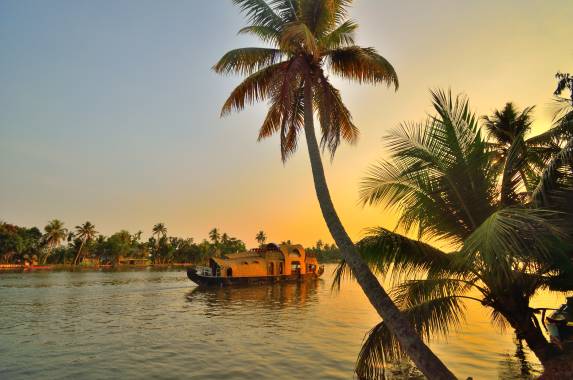
After a lie-in, enjoy an optional 13.5mi (22km) bike ride to explore the village or relax. Around midday, we board a backwater houseboat for an unforgettable trip to Trikunnapuzha. These converted rice barges have two-berth cabins and come with their own cook. With our bikes stacked on the side of the boat, you won’t see the saddle for another 19 hours, so just relax and watch the world pass.
Vessels of all sizes use the lakes and canals that make up this fascinating network of waterways. On one side of the canal, vast paddy fields of iridescent green stretch as far as the eye can see; on the other are fishing nets and coconut trees. As the sun begins to set, the boats are moored together and we gather on deck for sundowners.
Accommodation: Overnight houseboat
We have breakfast on the houseboats as they move from their overnight mooring point to our disembarkation point. Here we meet the support vehicle and set off along a quiet coastal road, passing by Amrithanadamayi Ashram, better known as the Hugging Mama Ashram, a spiritual retreat overlooking the backwaters.
We then join the main road to Quillon and have lunch at a seaside guesthouse: the fish is bought fresh from the market and cooked in mild spice and served with poratta, a favourite Keralan bread. After lunch, we are back on quiet roads for the last 18.5mi (30km) to Varkala, a small laid-back community with coffee bars and yoga schools perched along the clifftop. We spend the next two nights here.
Accommodation: Sajjoys Hotel (or similar)
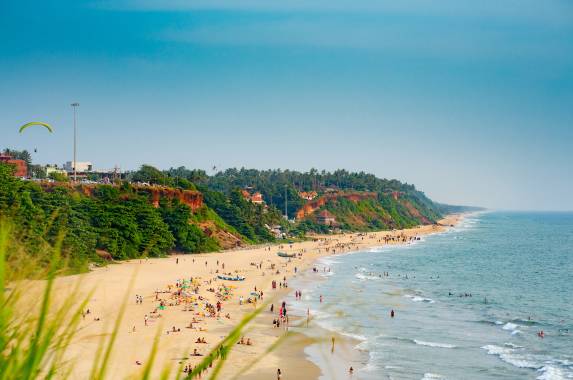
Today is free to relax and enjoy the beachside location. There are several beach shack restaurants for lunch, serving excellent seafood. Try the tandoori dishes, the clay ovens give a more authentic taste to breads and curries. The last night’s meal is generally at the hotel with a fusion of all your favourite Keralan dishes.
Accommodation: Sajjoys Hotel (or similar)
The adventure comes to an end today. Those catching the group transfer to the airport will usually have a very early departure this morning. For everyone else, the trip ends after breakfast.
If you’d like a little longer to explore, speak to your sales representative about extending your stay.
Accommodation
Hotels, lodge and houseboat

The accommodation on this trip includes 11 nights in hotels, one night in a safari lodge and one night on a houseboat. The accommodations typically used are found on the day-to-day itinerary. However, below are a few of the places we stay on this trip.
Room upgrades are available on Days 5, 8 and 9 of the itinerary – speak to your sales representative for more details.
Bandipur: Bandipur Safari Lodge (night 4)
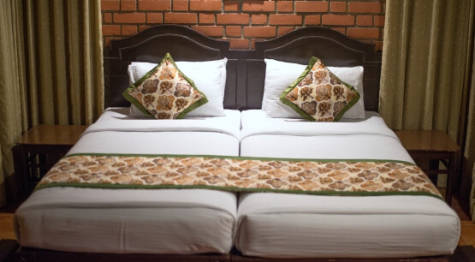
With an enviable position close to the national park entrance, Bandipur Safari Lodge is ideally placed for our adventures. We can be one of the first groups to take a game drive in the park, beating some of the crowds. The accommodation itself includes 22 rooms, a multi-cuisine restaurant and campfire setting.
Ooty: Fortune Resort Sullivan Court (night 5)
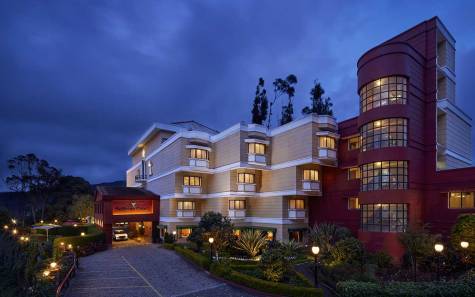
Named for John Sullivan, who founded Ooty in 1821, this 67-room resort has a scenic spot in the Nilgiri Hills. Food and drink options include the multi-cuisine Pavilion Restaurant and Selbourne’s Bar, where you can gather with the group over a wine, beer or mocktail. It’s also well located, close to the Botanical Gardens and Rose Gardens.
Trikunnapuzha: Traditional houseboat (night 11)
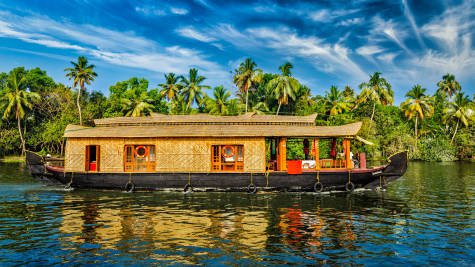
No trip to Kerala is complete without a houseboat stay. Typically, the boats are converted barges (known locally as kettuvallam), once used to transport rice from farm to market. They are comfortable and unique. All cabins have private bathrooms and the staff will keep you well fed. The houseboats have a deck and dining area, although the style/layout varies between boats. There is a cook, driver and assistants for each boat and the food is traditional Keralan fare using local produce. Houseboats have two to five twin-bedded rooms. Larger groups may be split over several boats; however, the group reunites at riverside stops and the overnight anchor point where your leader will be available.
Worth knowing
- Hotels in India usually do not have heating as there are only a couple of months when the weather can get cooler. You can request more blankets or the hotel may be able to provide a standing heater for your room. Please ask your tour leader if you need help in this matter.
Single supplement from £ 685
Food & Drink
Lunches on riding days are usually taken in roadside cafes, allowing us to sample typical south Indian dishes such as poori (deep-fried bread served with curry) and dosa (thin pancake made with fermented rice and lentil batter). South Indian food is heavily influenced by the tropical landscape; creamy coconut dishes enlivened with delicate spices, served on a banana leaf. It’s also an ideal destination if you are vegetarian. Tea and soft drinks are very cheap but a (large) bottle of beer is approximately 410 rupees (US$5). Please note, due to Kerala state laws, alcohol licenses are limited to one or two bars in each area and not all hotels are permitted to serve alcohol. The first day of every month and certain holidays in India are dry days, when no alcohol is permitted for sale.
Generally, you can eat out very cheaply in India. Where food is not included, you should allow at least 1,650 rupees (approximately US$20) per day for lunch and dinner.
Please note, service in restaurants can be quite slow.
Drinking water is provided in the support vehicle, where you can fill your bottle from the containers.
Transport
All your luggage and personal belongings will be carried by the support vehicle, which is a minibus.
The main transfers are using private mini-buses/coaches depending on the group size. The support vehicle follows the riders most of the time, allowing you to cycle as much or as little as you like. However, there is limited seating in the vehicle, and it is not possible to accommodate the whole group at the same time. On occasions, it is not possible for the support vehicle to follow the group, but we still meet the vehicle at regular intervals to replenish water supplies etc.
Please note, there are two short (approximately five to 10 minutes) ferry crossings on Day 8 where life jackets are not available; however, there are life rings available on all ferries.
Weather & Seasonality
The ideal time to visit is during the dry season from October to March. Days are hot and the nights warm, the average range of maximum daytime temperatures is 21C-35C (70F-95F) and 6C-20C (43F-68F) at night. Expect rain showers on November departures; however, they are usually quick and the sun normally comes out afterwards.
Mid-April to the end of May is the hottest time of the year with highs of 32C-36C (89F-97F) plus high humidity. The most important feature of the Indian climate is the monsoon. The main monsoon strikes the Kerala coast in late May and sweeps northward over the next month or so into July, but this reduces the humidity and temperatures drop to 27C-30C (75F-86F) making August and September a pleasant time to visit with lush fields and forests and lower rainfall to the previous months.
Please note, swimming in the sea at Varkala is not always possible, depending on recent weather conditions.
Joining Instructions
Key information
Start hotel: Hotel Sandesh The Prince, No. 3, Nazarbad Main Road, Mysore, 570010, Karnataka, India
Phone: +91 821 243 6777
Recommended arrival time: You can arrive at any time today, check-in is usually from midday. There will be a bike fitting in the late afternoon and a welcome briefing around 6pm this evening.
Airport: Bangalore Airport (BLR)
Getting to the start hotel
The start hotel is approximately four hours’ drive from the airport. Your options for this journey are:
Take an Exodus transfer
Exodus provides one group arrival transfer from the airport, which is timed to coincide with the arrival of a chosen flight from London, UK. You may join this transfer at no extra cost, provided you can be at the airport before the transfer leaves. Speak to your sales representative for the group arrival transfer times or to arrange a private transfer.
Make your own way
It’s possible to reach the start hotel by public transport, but the journey is complicated. We therefore recommend joining the group transfer where possible. If not, a cab from the airport to the start hotel costs approximately 7,500 Indian rupees (US$90). On arrival at the hotel, please make the reception staff aware that you are part of an Exodus group and they will have more details on meeting with your leader and group.
If you would like further information on joining this trip, please speak to your sales representative.
Catching your return flight
There’s a group departure transfer to Trivandrum Airport (TRV) for customers who Exodus booked onto a chosen flight to London, UK. Please speak to your sales representative if you wish to join. If the group departure transfer does not suit your flight time, speak to your sales representative to arrange an alternative transfer.
Full joining instructions including local emergency numbers will be sent to you as part of our Final Joining Instructions. If you do not receive these at least a week before departure, or require them earlier please contact our office or your travel agent.
Location start: Mysore
Location end: Varkala
What To Take
Essential Equipment
- High-factor sunscreen
- Warmer layers for the cooler mornings and evenings in the hills
- Cotton trousers (pants)
- Dull coloured clothing for the game drive
- Swimwear and towel
- Energy snacks
- Sandals with toe protection
- Water bottle or water bladder – the water bottle should be a standard size to fit into a normal water bottle cage on the bike
- January-February departures: Gloves for below-freezing temperatures in Ooty
Water included: Plastic bottles are a big issue in many countries where recycling isn’t yet widely available; they often end up in landfill or get burned. Both processes are harmful to the environment and we would like to reduce our impact here. For your trip, we provide an alternative to single-use plastic bottles to reduce the plastic used. This means that safe drinking water will be available throughout; all you need to do is bring a bottle to refill along the way. Please add this to your packing list.
Equipment Hire
Included standard bike
The standard bikes for this trip are Proformance bikes.
We will take your height at the time of booking to reserve equipment. If you have a preferred bike size, please request when booking.
E-bike upgrade
Electric bikes are available on this trip; prices from £175/US$245/335 Canadian dollars. Speak to your sales representative for more information.
E-bikes are not permitted on Ooty Hill (Day 5, optional ride) as the motors are prone to overheating and burnout due to the steep, continuous incline of this section. If you have booked an e-bike, you will be given two options on Day 5, either to use a mountain bike for the Ooty Hill ascent or you can choose to sit out this section and use the support vehicle.
Bringing your own bike
If you’d prefer to bring your own bike, please advise us at the time of booking and you will receive a discount on the price of the trip. However, you will be responsible for any extra baggage charges; assembling and disassembling your bike; and bringing along spare parts and any tools specific to it. You should also ensure you have adequate insurance to cover loss, damage or theft.
Accessories and clothing
Bringing equipment from home
You’re welcome to bring your own equipment, such as SPD pedals or clipless pedals, your own saddle (excluding the seat post), or gel saddle cover for the hire bikes. Your leader will help you fit these when bikes are distributed.
Helmets
Helmets are mandatory for everyone on a guided Exodus cycling trip. You must bring your own as, following best safety practice, they are not available for hire.
Cycling clothing
For all cycling trips we recommend:
- Padded cycling shorts: For destinations with more modest cultures, we also recommend loose ‘over-shorts’ for riding or rest stops
- Eyewear: Either sunglasses or eye protection with clear lenses to protect the eyes while riding
- Layers: For cycling in the cooler mornings
- Cycling gloves: Especially for riding off-road or on rugged surfaces
- Cycling shoes: Cycling is more efficient with stiff-soled shoes. We don’t recommend open-toed shoes or sandals
- Small close-fitting backpack or bum bag (fanny pack): To keep spare clothing or essential items to hand during the ride
Prohibited items to travel with in India
- The Indian government has banned e-cigarettes and related products. You can’t buy e-cigarettes in India or bring them into the country. Please ensure you do not pack these in your luggage.
- Satellite communications devices, for example (but not exclusively) Garmin inReach or any other brand GPS tracking device, are illegal in India without a license. Please do not bring them with you.
Practical Information
Visa
India
To avoid possible problems at immigration, make sure your passport is valid for a minimum of 180 days at the time of entry into India.
Travellers from the UK, US, CA and EU normally need a visa to enter India. Please note, visa requirements often change and it is your responsibility to obtain any required visas for this trip. Therefore, we recommend that you check with the nearest embassy or consulate of your chosen destination(s), including any countries you may be transiting or transferring through.
Some local governments provide guidance on what visas their citizens need. To help, we’ve gathered a selection of useful links below.
• Australia: www.smartraveller.gov.au/destinations/asia/india
• Canada: www.travel.gc.ca/destinations/india
• United Kingdom: www.gov.uk/foreign-travel-advice/india/entry-requirements
• USA: www.travel.state.gov/content/travel/en/international-travel/International-Travel-Country-Information-Pages/India.html
Travellers eligible for an e-visa, which includes those from the UK, US, CA and EU, can apply at www.indianvisaonline.gov.in/evisa/tvoa.html.
For more information on applying for your Indian Visa, including details required for your start hotel and local reference contacts, please click on this link: Indian Visa Information.
New Digital Arrival Card
Travellers from the UK, US, EU and Canada must also complete a Digital Arrival Card. This can be filled online up to 72 hours before arrival via the official Indian visa website https://indianvisaonline.gov.in/earrival/. This is separate from the Indian e-visa process and this remains the same. Physical cards will remain at the arrival airport until 1 April 2026, at which point the Digital Arrival Card will be made mandatory.
Vaccinations and Health
India
You require a yellow fever vaccination certificate if arriving from a country with risk of yellow fever transmission. Proof of a polio vaccination may also be required by some visitors. Please confirm all requirements and recommendations with your doctor or travel clinic.
You may also want to consider vaccinations for tetanus, hepatitis A, typhoid, cholera, hepatitis B, Japanese encephalitis, rabies and tuberculosis. The risk of malaria is slight, but you may wish to consult your doctor or travel clinic for further advice.
Additionally, dengue fever and chikungunya are known risks in India. Both are tropical viral diseases spread by daytime biting mosquitoes. There is currently no vaccine or prophylaxis available for either, and therefore the best form of prevention is to avoid being bitten. We recommend you take the usual precautions to avoid mosquito bites.
Some of our India trips spend time at altitude. In regions over approximately 6,560ft (2,000m), there is little risk of mosquito-borne diseases. For trips above 9,840ft (3,000m), there is a risk of being affected by acute mountain sickness. Our itineraries are designed to enable everyone to acclimatise to these altitudes, but you should be aware that it is still possible for you to be affected. Please see the Trip Notes for further information.
The risk of malaria on this trip is slight, but you may wish to consult your GP or travel health clinic for further advice.
The Travel Health Pro website recommends to have a rabies vaccination on this trip, as cycling is considered a higher risk activity.
Local Time
India's time zone: Asia/Kolkata (UTC +05:30)
Electricity
India's electricity: Plug types C (two round pins), D (three round pins) and M (three round pins) – 230V, 50Hz
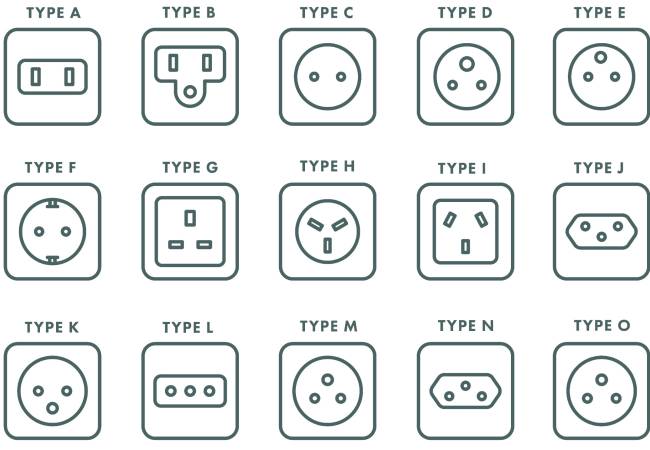
Money
India's currency: Indian rupee (INR). Please note, it is illegal to import or export rupees. Do not accept torn or very dirty Indian banknotes from banks or in change as they will almost certainly not be accepted as legal tender in India. You can normally change money back from rupees into US dollars or British pounds at the departure airport, but you must produce an exchange receipt showing that you changed money in India.
ATM Availability
ATMs are widely available throughout this trip (Visa and Mastercard are best). However, you should not rely on these 100 percent of the time, so bring cash too. You can also pay with credit cards in bigger shops all over India.
Extra Expenses & Spending Money
Many sites now charge a small fee for camera use. Allow at least 600 rupees (approximately US$7) per day for personal expenditures such as snacks and soft drinks.
India has very good shopping opportunities, especially for locally made goods. During your trip, it is highly likely your local guides will take you to emporiums and workshops where these goods are made. Many find this a great opportunity to buy local handicrafts, silk and carpets. Guides often assume visitors want to shop; if you do not wish to go, please make this clear to your local guide at the time.
Optional Activities
Additional optional activities available are as follows:
Fort Kochi:
- Kathakali dance show: 700 rupees (US$9) per person, based on a minimum of four people
Tipping
Tipping is part of the culture in India. However, it can often be an awkward affair, especially when you’re in an unfamiliar country. As such, your tour leader will offer to arrange and look after a tipping kitty, which will be used to tip hotel staff, local guides, airport transfer drivers and other support staff on the trip.
Your leader will suggest how much to contribute, depending on group size, but it is usually in the region of 5,700-6,300 rupees (approximately US$70) per person. At any time during the trip, your leader will be happy to show you an account of how the kitty is being distributed.
Tips for the tour leader and drivers and cycle crew are not included in the kitty and are at your own discretion. Our local leaders and staff are paid fairly for their work; however, if you wish to show your appreciation, our recommendation is as follows:
- For the driver, assistant leader, and mechanic: Around 400 rupees (US$5) per passenger per day
- For your tour leader: Around 400 rupees (US$5) per person per day
It is preferable to tip in local currency where possible.
Sustainability and Impact
As a certified B Corp, we’re on a mission to improve our social and environmental impact across all our adventures.
We do this through our innovative Thriving Nature, Thriving People plan.
This ‘nature positive’ approach is designed to help nature and communities thrive in harmony through practical solutions, such as reducing carbon and waste on our trips, supporting conservation projects through the Exodus Adventure Travels Foundation, and rewilding 100 square metres for every Exodus traveller.
Important Information
Your Safe Participation
When booking this trip, you should be confident in your ability to participate in all activities described in these Trip Notes. If you have any doubt about your suitability, please call us and ask to speak to one of the experts on this itinerary.
Although our leaders are well trained to deal with different capabilities, if they have any concerns about someone’s ability to safely take part in an activity, or their impact on other people’s enjoyment, we authorise them to take necessary action which, in some circumstances, may involve asking someone to miss that activity.
By booking this trip you agree to our Booking Conditions which clearly state that our leaders have the authority to do this. In these rare instances we will ensure anyone sitting out is safely provided for and offered alternative options where possible. Refunds will not be provided for activities missed and customers may be liable for additional costs incurred.
Seatbelts
All vehicles used by us should be equipped with working seatbelts, except where approved by us based on the vehicle type or journey. Wherever seatbelts are available, we require our customers to use them for their own safety, even where it may not be a legal requirement.
Travel Safety
For additional information please have a look at the travel safety advice page on our website.
How to Book
Speak to our friendly team of experts to plan your adventure:
- Check availability: our website shows real-time availability of our guided group tours, or contact our team by phone, email or live chat.
- Hold a space: You can provisionally hold a space on any guided group tour to give you time to finalise your travel plans.
- Confirm your booking: Payment of a deposit will complete your booking and secure your place on the trip.
After booking
You will receive a confirmation document and invoice, which includes extra information and guidance about your travel arrangements. Our dedicated Customer Operations team will help you with any pre-travel questions or arrangements and can easily add extensions or extra accommodation to your booking. Final Joining Instructions will usually be sent out two to three weeks prior to departure.
Adding transfers to your booking
If you have arranged your own flights and would like to add transfers to your booking, please provide your arrival and departure details to our Customer Operations team around four to six weeks before departure.
- Where free transfers are included, they are available for any flight but can only be added to your booking once we have received your flight schedule.
- Where group arrival and departure transfers are available, these operate at fixed times. You will need to arrive in time to meet the scheduled transfer. If the timings don’t align with your travel plans, our team can arrange private transfers once they receive your flight schedule.
Trip Note validity
Trip notes may be updated after booking; if any updates significantly impact the inclusions or itinerary you will be advised in writing. A link to the most up-to-date Trip Notes will be sent out with your Final Joining Instructions before departure.
The information in these Trip Notes is given in good faith. All holidays can be subject to unexpected changes, and occasionally it may not be possible to follow the itinerary as planned. In these circumstances we will make the best-possible alternative arrangements that maintain the integrity of the original itinerary.

